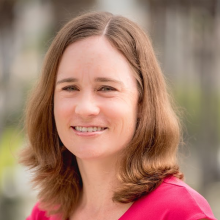March 2011 Spotlight on the SRCD Policy Fellow: Melinda Leidy, Ph.D.
2010-2011 Federal Executive Branch Policy Fellow
After spending last year as an SRCD Policy Fellow in the Senate Health, Education, Labor and Pensions Subcommittee on Children and Families, I was eager to experience the policy realm from the executive branch of government. I wanted to see how policy was both implemented and evaluated. I was also eager to learn how the work of the executive branch of government can influence future policy decisions made by Congress and vice versa. This year I have had the privilege of working in the Office of Planning, Research and Evaluation (OPRE) in the Administration for Children and Families (ACF). OPRE develops and oversees research and evaluation projects that assess the effectiveness and efficiency of ACF programs and inform policy and practice. My fellowship experience at OPRE has been a great fit for me. I work with an incredible staff, including former SRCD fellows, who are always available to answer my questions, offer feedback, and help me learn and grow professionally. I have also been fortunate that OPRE let me choose which projects I wanted to get involved in.
One of the projects I chose to get involved in is the Permanency Innovations Initiative. This project seeks to improve permanency outcomes for children with the most serious barriers to permanency in the foster care system. At the end of September, six sites were awarded five year grants. This first year is a planning year so I have been part of a team from OPRE working with the Children’s Bureau and our technical assistant and evaluation contractors to help the grantees plan their intervention. The goal of these grants, in addition to reducing long term foster care, is to build an evidence base for effective practice that can be implemented in other settings. This has been both fascinating and exciting to be a part of. We have been working with the grantees to use data to help define the needs and characteristics of their population of foster children. This will then guide the planning for the interventions and evaluation assessments. It is exciting to feel like the work we are doing this year has the potential to impact hundreds of foster children down the line.
I am also overseeing the Migrant Seasonal Head Start CARES (Classroom-Based Approaches and Resources for Emotion and Social Skills Promotion) project. With this project, I am working closely with our contractor to adapt a current social emotional program for use in Migrant and Seasonal Head Start settings. This has involved working closely with the Office of Head Start, the model developer, and the contractor to adapt the intervention to fit with the Migrant and Seasonal Head Start setting and the needs of the enrolled children, while staying true to the core principles of the selected evidence-based model. For this study we are particularly interested in the implementation and adaptation process, which has involved designing and implementing an effective professional development process, selecting programs to participate in this study, and identifying and finalizing the key research questions.
One task that is typically given to SRCD Fellows in my office is the Head Start Graduate Student Research Grants. These are dissertation grants for graduate students to partner with a local Head Start program. I was given the task of writing the Funding Opportunity Announcement which will soon be posted. In the coming months I will help form a review panel and oversee the grant review process. I look forward to gaining first-hand knowledge about the grant review process from the federal perspective. I know that this knowledge and insight will prove valuable regardless of the job I pursue in the future.
In addition to these projects, I have had many opportunities to network and make contacts not only within ACF and other government agencies, but outside the government as well. I have attended numerous meetings that have brought together federal employees, researchers, academics, and practitioners. It has been very enlightening to attend technical working group meetings to see how research and policy intersect in various projects. I have also attended the Child Care Policy Research Consortium meeting, the Implementation Science Research Methods meeting, and the Secretary’s Advisory Committee on Head Start Research.
I can hardly believe the first half of my fellowship is over. I feel incredibly fortunate to have been able to work at OPRE and be an SRCD Policy Fellow. I look forward to the second half of this fellowship and know I will continue to learn and grow professionally in the coming months.
